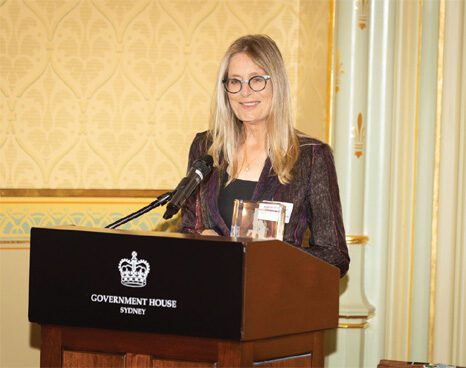Helen Christensen is the NSW Scientist of the Year for 2024
Professor Helen Christensen from the University of NSW and the Black Dog Institute was recognised as the NSW Scientist of the Year in the Premier’s prizes for science and engineering last October, receiving a trophy and $60,000 in prize money.
Helen’s work has made an impact on mental health care both in Australia and internationally.
In 2000, she developed the digital intervention program MoodGYM to reduce depression in young people, which has been used by millions of people across more than 160 countries.
She was executive director and chief scientist at the Black Dog Institute from 2011 to 2021, while her work creating a model of suicide prevention has been incorporated into national and state suicide prevention plans.
Helen (now living in Coogee) was born in Canberra before moving to Warriewood in Year 10 and attended what was then Narrabeen Girls High, adjacent to Narrabeen Boys High (now Narrabeen Sports High). Helen loved going to the beach after school but wasn’t really a ‘surfy girl,’ preferring a quiet spot on Turimetta Headland to read feminist literature like The Female Eunuch by Germaine Greer.
“It was quite an amazing experience growing up on the Beaches,” Helen recalls. “There wasn’t a lot there over 50 years ago. We used to walk across a paddock to get to school.”
Helen began her science career carrying out experiments and tests on how dementia affects memory.
“I’ve always been interested in how the brain and the mind work,” says Helen. “When I started, I was interested in the mechanics of memory and testing people to see how their memories worked, but I gradually moved into clinical psychology (researching) what are the mechanisms by which you can change people’s brains?
“It’s a fascinating area and one of the unchartered areas of research. And it’s good to see how practical it is to learn something in these trials and put them into practice. It’s not just wanting to help people, but also the pursuit of knowledge about something so complex as the human brain.”
Helen’s focus over the past number of years has been tackling mental health issues, particularly in young people, with a focus on digital platforms.

Helen was honoured to receive her award
“There weren’t any psychological services for young people with anxiety and depression 25 years ago – at least they weren’t paid for by the government, with no Medicare rebate,” explains Helen. “But we knew that cognitive behaviour therapy was an effective treatment for depression and anxiety, so it was a question of access.”
Helen says that online resources could be as effective as face-to-face interventions, although they might not suit everyone. The arrival of smartphones meant that apps could be developed. Helen and her team are now looking at how ChatGPT could help train psychologists or gatekeepers and how artificial intelligence (AI) can make treatment more precise based on a person’s characteristics.
“You’ve got all these huge developments in AI with people putting so much money into it,” Helen says. “But I don’t think (we’ve) even scratched the surface of what AI can do.”
Helen says they are doing a lot of work in digital genotyping, which is how to collect and use data from smartphones to understand possible mental health risks to their users.
“People carry this device that could passively pick up signs and symptoms of risk. The scientific question is, ‘Can you and how do you detect this?’ Helen says. “We’re trying to work out things like how you type on your phone, or your facial recognition could (flag) markers of depression or anxiety.”
Helen was honoured to receive her Scientist of the Year award and says that it was exciting to get recognition for scientific work in mental health, now a leading global health concern.
“Mental health science has the power to transform lives,” Helen says. “We’re at a tipping point where advancements in genetics, AI, and software engineering are reshaping our understanding of mental illness.”








